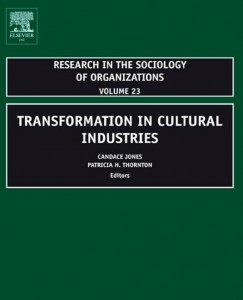 The cultural industries have been considered unique and out of the mainstream, not a subject for developing general theory, and therefore relatively understudied by organizational scholars. We argue it is no longer the case that cultural industries are so unique – representing small markets and industries of little matter to research in the sociology of organizations. Cultural industries are now one of the fastest growing and most vital sectors in the U.S. and global economies (U.S. Census Reports, 2000). This growth is fueled in large part by the nature of the symbolic, creative, and knowledge-based assets of cultural industries.
The cultural industries have been considered unique and out of the mainstream, not a subject for developing general theory, and therefore relatively understudied by organizational scholars. We argue it is no longer the case that cultural industries are so unique – representing small markets and industries of little matter to research in the sociology of organizations. Cultural industries are now one of the fastest growing and most vital sectors in the U.S. and global economies (U.S. Census Reports, 2000). This growth is fueled in large part by the nature of the symbolic, creative, and knowledge-based assets of cultural industries.
In this volume, the manuscripts recognize that the functions of the symbolic, creative, and knowledge-based assets of cultural industries are also characteristic of the professional services and other industries as well. The manuscripts illustrate how the boundaries become blurred between cultural and other related industries that also rest upon the endeavors and knowledge of creative workers. These dynamic interactions in the commercial landscape between the cultural, professional services, and other industries provide a richer context for the authors in this volume to examine changes in a specific market or industry, and also to advance our understanding of the institutional transformation of organizations.